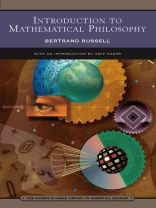Introduction to Mathematical Philosophy has been a seminal work for more than nine decades. It gives the general background necessary for any serious discussion on the foundational crisis of mathematics in the beginning of the twentieth century.
Requiring neither prior knowledge of mathematics nor aptitude for mathematical symbolism, the book serves as essential reading for anyone interested in the intersection of mathematics and logic and in the development of analytic ...
About the author
Bertrand Russell was educated at home until he was eighteen, and then he went to Cambridge to study mathematics and philosophy. He was the second son in an ari...
Buy this ebook and get 1 more FREE!
Language English ● Format EPUB ● Pages 208 ● ISBN 9781411429420 ● File size 0.5 MB ● Age 99-17 years ● Publisher Barnes & Noble ● Published 2009 ● Downloadable 24 months ● Currency EUR ● ID 8513463 ● Copy protection Adobe DRM
Requires a DRM capable ebook reader












